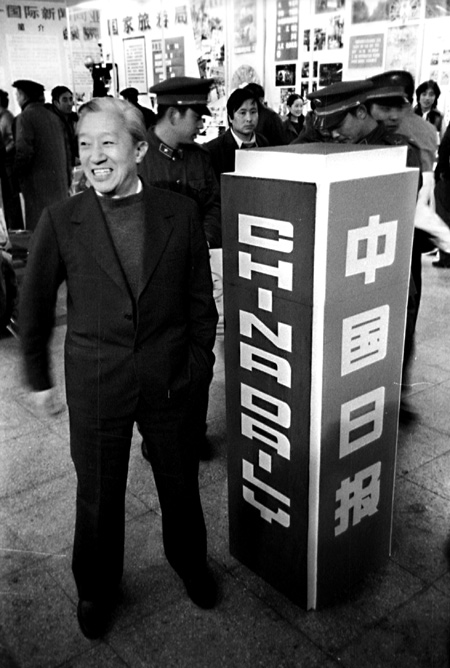|
Veteran journalist's legacy lasts
(China Daily)
Updated: 2006-02-02 07:20
Feng Xiliang, a veteran journalist and founder of China Daily, died on Monday
evening in Beijing at the age of 86.
Feng, also known as C.L. Feng, devoted almost his whole life to journalism,
ever since he chose it as his undergraduate major at St. John's University in
Shanghai.

China Daily founder
Feng Xiliang participates in a media exhibition in the mid-1980s in
Beijing. Feng died on Monday in Beijing at the age of 86. |
|
His career culminated when he and several other veteran Chinese journalists
founded China Daily, the establishment of which was testament to China's
determination to reform and open to the outside world.
In a time of reform, Feng, as the paper's managing editor (1981-1984) and
then editor-in-chief (1984-1987), was a trailblazer.
Established foreign language news magazines and periodicals in China at that
time focused on translating Chinese language articles into foreign languages.
Feng however insisted that China Daily reporters write news and feature
stories and commentaries in English, to better serve the paper's target
international readership.
He led his staff to adopt common and interpretive language while departing
from the conventional stereotypical reporting charged with political jargon and
slogans.
He encouraged and helped train a large number of young reporters to tell
stories of the Chinese people in English, while covering the wide spectrum of
Chinese society and recording the dramatic changes China has experienced since
the reform and opening up began in the late 1970s.
Meanwhile, upon his suggestion, China Daily became the first newspaper since
1949 to print news and features from international wire services, as the paper
took upon itself the task of informing international residents and travellers in
China what was happening around the world.
At the same time, Feng introduced new ideas to encourage Chinese photo
journalism. When the convention was still to highlight objects such as new
machines or grain harvests as the main news photos to show China's development,
Feng asked China Daily photographers to forget this and instead focus on the
people.
"He (Feng) told us that China Daily pictures, whether they are of leaders or
ordinary people, should be vivid, because this represented the essence of
journalistic photography," Wang Wenlan, chief of China Daily photo department,
recalled.
In so doing, China Daily established itself among domestic newspapers for the
unique style of photo editing and set itself as role model for others to follow.
"Looking back now, I realize that we succeeded because we dared to adapt
foreign things to Chinese needs and never bothered to be fettered by existing
practice," Feng recalled in an essay he wrote in 2001 for the photo album,
"China Chronicle."
In 1983, Feng won the first "Best Eye" prize ever presented in Chinese
photojournalism for his insight and perception in the use of pictures and the
training of photojournalists. Over the years, China Daily photo journalists have
won numerous national news photo awards.
In 1984, Feng was awarded the Missouri Honour Medal for Distinguished Service
in Journalism by the Missouri School of Journalism, for his lifetime
achievements and distinguished services in his journalistic endeavours.
After graduating with a BA in journalism from St. John's University in 1943,
Feng pursued his further studies at the Missouri School of Journalism, earning
his MA in journalism in 1948. He then continued at Columbia University with his
focus on graphic art.
In 1950, he returned home to join Beijing International News Department and
started his lifelong profession of reporting China to the outside world.
He started as world news editor and became managing editor of People's China,
an English language magazine. Between 1958 and 1978, he worked as international
news editor and then deputy editor-in-chief of the weekly news magazine Beijing
Review.
In 1978, he became a member of the four-man commission for the founding of
New China's first national English language newspaper, the China Daily.
In retirement, he served as the paper's editor emeritus and special advisor
and chairman of the China Daily Distribution Corporation in New York. He was
also invited to join the advisory board of the Window news magazine in the early
1990s and later the South China Morning Post in Hong Kong.
For years after 1986, he was also a member of the National Committee of the
Chinese People's Political Consultative Conference.
He was survived by his wife and daughter.
 (China Daily 02/02/2006 page2) (China Daily 02/02/2006 page2)
|